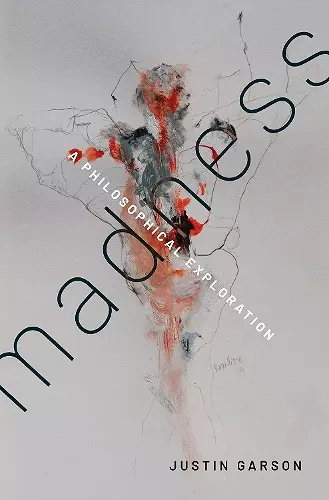Madness
A Philosophical Exploration
Format:Hardback
Publisher:Oxford University Press Inc
Published:9th Jun '22
Currently unavailable, and unfortunately no date known when it will be back

Since the time of Hippocrates, madness has typically been viewed through the lens of disease, dysfunction, and defect. Madness, like all other disease, happens when something in the mind, or in the brain, does not operate the way that it should or as nature intended. In this paradigm, the role of the healer is simply to find the dysfunction and fix it. This remains the dominant perspective in global psychiatry today. In Madness: A Philosophical Exploration, philosopher of science Justin Garson presents a radically different paradigm for conceiving of madness and the forms that it takes. In this paradigm, which he calls madness-as-strategy, madness is neither a disease nor a defect, but a designed feature, like the heart or lungs. That is to say, at least sometimes, when someone is mad, everything inside of them is working exactly as it should and as nature intended. Through rigorous engagement with texts spanning the classical era to Darwinian medicine, Garson shows that madness-as-strategy is not a new conception. Thus, more than a history of science or a conceptual genealogy, Madness is a recovery mission. In recovering madness-as-strategy, it leads us beyond today's dominant medical paradigm toward a very different form of thinking and practice. This book is essential reading for philosophers of medicine and psychiatry, particularly for those who seek to understand the nature of health, disease, and mental disorder. It will also be a valuable resource for historians and sociologists of medicine for its innovative approach to the history of madness. Most importantly, it will be useful for mental health service users, survivors, and activists, who seek an alternative and liberating vision of what it means to be mad.
This work will have immense appeal across fields, including philosophy of mind, psychiatry, the history of Western thought, the sociology of medicine, and mental health services. * M. Uebel, CHOICE *
I cannot remember the last time I read a book of philosophy that taught me something new and also took me on such a journey of images and soundsa powerful reminder that, yes, rigorous philosophical ideas can be expressed in many forms, including excellent prose. Justin Garson's Madness reads like a novel but instructs like an encyclopaedia. I revelled in an engaging narrative filled with suspense and cliff-hangers, where I challenged myself to anticipate the next twist...This was a journey of self-transformation and, as such, it was an often uncomfortable read: I have always thought of myself as someone who accepts a largely medicalized view of madness but is vocal about madness having meaning and purpose. While reading the book and for a long time afterwards, however, I became seriously concerned that I could not be both; that I had to choose. * Lisa Bortolotti, University of Birmingham, British Journal for the Philosophy of Science Review of Books *
I do not use 'brilliant' often, but no better word comes to mind for Garson's intriguing perspective-shifting exegetical journey through the highways and byways of historical writing about mental disorder. It has often been recognized that madness offered compensations, some of them cathartic, consoling, even healing. Now, suddenly, we find ourselves seeing those compensations not as haphazard if lucky side-effects, but as part of the order of things. And through this remarkable sleight of hand, Garson offers us what has long been sought by philosophers of psychiatry: a plausible place for disorder within our era's neo-Darwinism. * Jennifer Radden, University of Massachusetts, Boston *
The fundamental, yet original, insight of this book is that theories about mental illness are always, in one sense or another, theories about design; and that surveying the different stances on design developed through psychiatry's history can provide as fruitful a taxonomy for understanding the field as more traditional conceptual schemas, like 'mind' and 'body' or 'biological' and 'constructed.' Garson builds upon his impressive work in philosophy of biology to make a contribution that will make a big splash among philosophers of psychiatry, and among those working in the life sciences more broadly. * Kathryn Tabb, Bard College *
Garson's new book is a much-needed presentation of an alternative tradition in psychiatry — a tradition that is invisible or marginalized in the history of psychiatry, that is, the tradition of considering mental disorders as functional. While most people in the field maintain that mental illness has always been conceptualized as some kind of dysfunction, Garson argues eloquently that this is a mischaracterization. By looking attentively at well-known (and sometimes, forgotten) theoreticians of madness as well as contemporary research programs, Garson offers a counter-narrative that will challenge prevalent views and will open theoretical possibilities. * Luc Faucher, Université du Québec, Montréal *
Is someone whose thoughts and feelings take a strange turn deranged and disordered? Or are they instituting some tactic, some way forward, on their quest to make do and find meaning? Is there a reason behind their madness? Is there perhaps some innate design? These are, quite literally, questions for the ages, and Garson tackles them all-and more-with a thoroughness, a calm and inclusive meticulousness, that impresses while it persuades. * MadInAmerica.com *
Justin Garson's Madness: A Philosophical Exploration offers a conception of madness that infuses hope to those whose lives are touched by it...By successfully marshalling the tools of philosophy, psychiatry, and history, Garson offers new conceptual resources for making sense of madness and loosens the grip of the madness-as-dysfunction model in contemporary psychiatry...Garson's analysis is rich, compelling, and even poetic. * Notre Dame Philosophical Reviews *
ISBN: 9780197613832
Dimensions: 163mm x 243mm x 26mm
Weight: 590g
304 pages